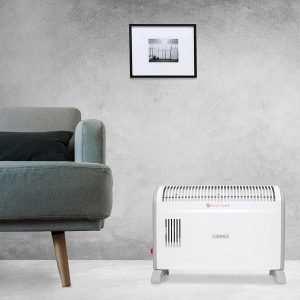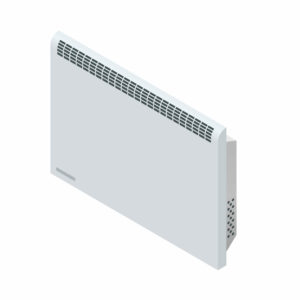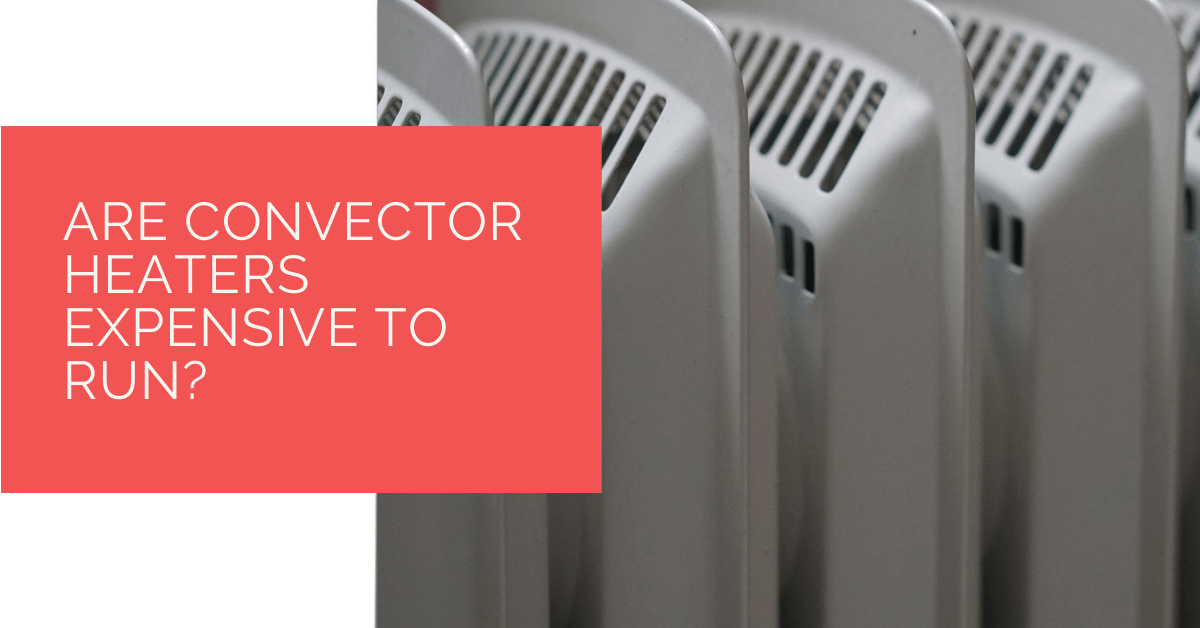Heating appliances are a great way to keep the cold snaps away and keep yourself warm and cozy in winters. Winters in Britain are rather cold, windy, and wet, with the temperature often dropping below the freezing point. The sunlight hours are short, and the wind is freezing.
The onset of winters in the UK brings a much-needed respite from the summer’s overheating. However, they are no better than the blazing summers when the temperature suddenly drops on the long cold days.
On such days, convector heaters are a godsend. Read on ahead to understand why these multifaceted heating devices make a good investment.
Contents
Key Takeaways
- Convector heaters are a cost-effective and versatile option for heating small to medium-sized rooms in the UK, especially during cold winters.
- To determine the cost of running a convector heater, you need to calculate its electricity usage by converting watts into kilowatt-hours and multiplying it by the cost per kilowatt-hour, which varies by region and electricity provider.
- Convector heaters are just one type of heating appliance, and there are various alternatives, such as oil-filled, ceramic, water, fan, and furnace heaters, each with advantages and disadvantages. The choice between convector heaters and electric radiators depends on factors like portability and primary heating needs.
What is a convector heater?
A convector heater runs on the principle of convection and heats the air that comes into its contact. It replaces the cold air in its surroundings by heating it through the process of air convection. To put it simply, it’s like cooking an egg in a frying pan.
 They also warm up the cold air gradually and slowly until it has achieved a higher temperature. Additionally, they are sleek and stylish and are capable of heating small to medium rooms with minimal noise.
They also warm up the cold air gradually and slowly until it has achieved a higher temperature. Additionally, they are sleek and stylish and are capable of heating small to medium rooms with minimal noise.
They come equipped with a wide range of modes, allowing you to crank the temperature without leaving your blanket.
Yes, that’s right! You don’t even have to get up from your warm bed just to adjust the temperature. However, this completely depends on the kind of model you’re investing in. Not all heaters come with this feature.
How much does it cost to run a convector heater?
These portable heaters that can be moved from one space to another are a blessing, but how much do they cost to run?
To know how much a convector heater costs to run, you first need to figure out its electricity usage. You can find the electricity consumption of your convector heater from the label or metal plate stamped on them.
These labels are usually placed on the back of the heater, on which volts and watts consumption of the device are mentioned.
Your utility bill is based on the unit of electricity consumed. This means you need to convert the watts into kilowatts, which is the unit of electricity. Once you complete converting the watts into kilowatt-hours, you need to determine how much you pay for each kWh.
Now, the cost per unit of electricity differs from region-to-region and electricity provider. So, the most reliable way to find how much you pay for 1 kW is to check your monthly electricity bill. The cost of a unit of electricity is usually written as 20p/kw, which means you pay 20 pence for each unit.
Once you have all this data, you simply need to multiply all these variables to get the final cost. In other words, you need to multiply per unit electricity cost, kilowatts hours consumer, and total run time of the heater.
When you multiply these three variables together, you get the total cost of running a convector heater. Now, you can decide for yourself if running a convector heater is expensive or not. If you think it’s on the pricey end, you can also explore other types of heaters.
Different types of convector heaters
Convector heaters are mainly of five types: oil-filled, ceramic, water, fan, and furnace. Although these heaters work on the principle of air convection, they generate heat on different scales and manners.
Here’s how these different heaters function and keep you warm and cozy in winters.
Oil-filled heater
Oil-filled heaters are the most commonly used heating appliances in homes and offices. They evenly distribute the generated heat across the room. Furthermore, it’s cost-effective, allergen-free, and practical.
They use diathermic oil, which helps in the retention of heat even when the device is switched off. The oil is only required to heat the outer fins of the heater for faster heat generation and thus doesn’t require refilling.
Not to mention, its energy-efficiency feature is what makes it so popular among households. Even so, not many view this heater as a viable option due to the common myth that it runs on oil.
An oil heater doesn’t run on oil but electricity.
Ceramic heater
Ceramic heaters are a great choice to crank the temperature of a small space instantly. This heating device is compact and thus can be easily moved from one place to another. Additionally, its spot-on heating is excellent to direct heating towards a specific direction or space.
This feature is extremely helpful for households packed with children and the elderly who may burn themselves by mistake.
Water heater
 Nothing beats a hot shower after a tiring day. Although installing a geyser in your bathroom does the job, what about other chores requiring water during winters? This includes washing, cooking, and cleaning. Not to mention, nobody likes to soak their hands in cold water during cold days.
Nothing beats a hot shower after a tiring day. Although installing a geyser in your bathroom does the job, what about other chores requiring water during winters? This includes washing, cooking, and cleaning. Not to mention, nobody likes to soak their hands in cold water during cold days.
Investing in a water heater, therefore, saves you from this misery. They heat the water and supply it through pipes that pump whenever you open a tap or shower.
You can also adjust the level of water temperature according to your need.
Fan heater
Fan heaters are compact and can heat any small space immediately. These heaters are lightweight and can easily be moved from one place to another. They are also very cost-effective, practical, and energy-efficient.
This compact heating appliance can also direct heat to a specific direction or a corner. Some fan heaters are designed to include the option of oscillation for heating small to medium rooms.
Furnace heater
The furnace heater distributes warm air through ducts to crank up the temperature. It’s usually used as a central heating system. This heating system is generally mounted on walls or in storerooms as they are large. Furthermore, the furnace heating system runs on gas, oil, or electricity.
Unlike other heaters, which are more or less portable, these heaters are not. Moreover, this heating system is designed to heat large spaces or an entire household. Therefore, they tend to be on the expensive end.
What is an electric radiator?
Electric radiators are a popular heating system in the United Kingdom and have dominated the home heating market. They can be fitted anywhere in the home and still give off an unparalleled contemporary touch to the interior.
They use a combination of convection and radiation to heat the space. This means that it heats the air and the nearby objects for better heat retention. As a result, the room heats up in a lesser amount of time when compared to its convector counterpart.
Not to mention, these heating devices come equipped with versatile energy-saving features. It also converts most of the energy it draws into reusable heat, highlighting its clever technology and energy efficiency.
You can also control this device using Bluetooth and Wi-Fi through its dedicated app.
Which is better- a convector heater or an electric radiator?
Both heating appliances have different utility purposes and advantages. Convector heaters are unmatched when it comes to portability and instant heating solutions. However, they are not suited for primary heating, which is not the case with electric radiators.
Electric radiators, also undoubtedly, simplify your heating concern and are an ideal home heating solution for your residence. Then again, they don’t score very high when it comes to portability. Additionally, there will always be a fear of getting burned if your household has children, pets, or the elderly.
Convector heaters, on the other hand, are much more friendly in this aspect, even if less energy-efficient comparatively. They are lightweight, heat up quickly, and evenly distribute the heat within their range. Some convector heaters come with remote control through which you can manage their setting from a distance.
Heat Pump Source: Reliable Heating and Cooling Solutions
At Heat Pump Source, we take pride in our unwavering commitment to serving the UK with top-tier HVAC solutions. From the efficiency of heat pumps and the cool relief of air conditioning to the warmth of boilers, radiators, and underfloor heating, our dedicated team is always at the forefront of innovation. We understand the unique needs of every household and business, and we strive to provide dependable health and cooling products and services that are tailored just for you. Ensuring your comfort and satisfaction is our utmost priority. Whether you have questions, need guidance, or require support, we’re always here to assist. Please don’t hesitate to contact us; we’re eager to be of service.
Final thoughts
Convector heaters are an excellent home heating appliance and offer a quick heating solution whenever needed. They are very handy, cost-effective, and serve a wide range of purposes.
They come in all shapes and sizes and offer a minimal risk of burning. They heat up relatively quickly and can be stored away when not needed. Moreover, they are a great way to warm your feet.
Some convector heaters also come with motion sensors and remote control, making them extremely convenient. This saves you the trouble of getting up from your cozy bed to turn off unwanted heat.
Furthermore, this electric heater is becoming more and more stylish. Some convector heaters don’t even look like a heater and are more like retro-inspired radios.
About the Author
At Heat Pump Source, our articles are the product of a collaborative effort among a team of highly skilled HVAC experts. Our dedicated professionals, hailing from diverse backgrounds in heating, ventilation, air conditioning, and refrigeration, contribute their extensive knowledge and experience to every piece of content. This multidisciplinary approach ensures comprehensive coverage. Our commitment is to deliver authoritative, reliable, and tailored advice to meet the unique needs of every household and business across the UK.

